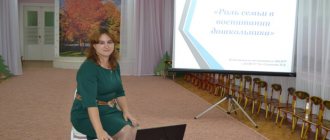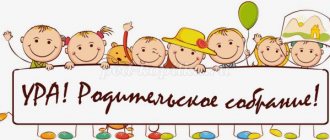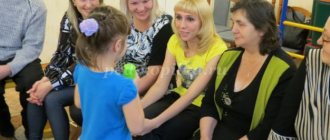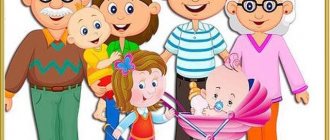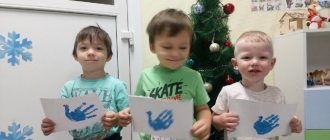Parent meeting invitation templates
Dear __________________________________________________________________________________________________________________________________________
Your child has become a kindergarten student.
How his relationship with his children will develop, what difficulties he may encounter along the way, how to make sure that there are fewer difficulties - our first meeting with you will help answer these questions and many others. Our meeting “Let's get to know each other” will take place on July 5, 2015 at 17-00 in the music room.
We hope that the presence of both dad and mom (if possible) at parent meetings will become a beautiful tradition in our kindergarten.
Looking forward to meeting you, your teachers.
_______________________________________________
Dear
____________________________
________________________________________________________
We want our child to do well in school and be sure to achieve success in his future life, because we know the price of success. In order to become a successful person, outstanding personal qualities alone are not enough; you also need knowledge, well-developed abilities and... good health.
We invite you to the parent meeting “Kids, physical school, hello!”
(
“Coordination of the efforts of family and children in creating a healthy lifestyle”),
which will take place on ________ in ______ in the gym
Looking forward to meeting you, your teachers.
DEAR
According to statistics, parents and children communicate with each other, in general, about 30 minutes a day, you will agree that this is very little. That is why today we will communicate with each other, we will learn to understand each other.
We invite you to the parent meeting “Harmony of communication is the key to a child’s mental health”,
which will take place on _________ in ______ in the office of an educational psychologist.
Looking forward to meeting you, your teachers.
____________________________________________________
DEAR
Why do some people, when faced with difficulties, successfully overcome them, while others do not?
Why do some people know how to find a way out of a hopeless situation, while others easily give up? Why are some winners and others losers? Perhaps the key to many of our victories and failures lies precisely in HOW at the beginning of our lives we learn to cope with disappointments and stress...
WE invite you to the parent meeting
“How to help your child cope with experiences”, which will take place on _______ ____ year in _______ in to our group.
Looking forward to meeting you, your teachers .
DEAR
Why do some people, when faced with difficulties, successfully overcome them, while others do not?
Why do some people know how to find a way out of a hopeless situation, while others easily give up? Why are some winners and others losers? Perhaps the key to many of our victories and failures lies precisely in HOW at the beginning of our lives we learn to cope with disappointments and stress...
I invite you to a parent meeting
“How to help a child cope with experiences”, which will take place on ________ in the music room
Looking forward to meeting you, your teachers .
_________________________________________________________________________________________________
DEAR
The school year has ended... Let's remember what it was like for us, what worked and what perhaps didn't... And maybe together we will decide how to further build relationships between our children. Our meeting “So we have become a year older...”
will take place
______
year in ______ in the group.
Looking forward to meeting you, your teachers.
DEAR
Today we are faced with rampant aggression not only in society, but we also observe the propaganda of aggression and violence from television screens and computer displays. The age of manifestation of aggression has clearly become younger. It is shown not only by teenagers and adults, as is commonly believed. Even kids show aggression. How to deal with childhood aggression? We will try to answer these and other questions today.
We invite you to the parent meeting “Aggression, its causes and consequences ”,
which will take place ______ year in ______ in the music hall.
Looking forward to meeting you, your teachers.
_____________________________________________________________________
DEAR
“Family and kindergarten are the shore and the sea. On the shore, a child takes his first steps, receives his first life lessons, and then a boundless sea of knowledge opens up before him………..
We invite you to the parent meeting “Interaction and mutual understanding between kindergarten and family”,
which will take place on _______ year in ______ in the group.
Looking forward to meeting you, your teachers.
DEAR
In order to raise a full-fledged person, a cultural, highly moral, creative and socially mature personality, it is necessary for educators and parents to act as allies, sharing their kindness, experience, and knowledge with children. We will talk about your children, about what role the family and kindergarten play in upbringing, since the family and kindergarten are two social institutions, and the effectiveness of the process of raising a child depends on the coordination of actions.
We invite you to the parent meeting
“ The Role of the Family in Personality Formation ,” which will take place on _________ in_______ in the music hall.
Looking forward to meeting you, your teachers .
_________________________________________________________________
DEAR
Come have fun, Play and frolic, On Friday, at exactly five, We will be waiting for “Oseniny”.
We invite you to a family holiday, which will take place on September 25, 2015 at 10-00 in the music room.
Looking forward to meeting you, your children and teachers
USED SOURCES
When creating the invitations, illustrations from the following sites were used:
https://office.microsoft.com/ru-ru/images/CM079001901.aspx#ai:MP900439469|
https://photo.zoneitnet.ru/details.php?image_id=9303
https://2berega.spb.ru/user/Nadegda797/file/1600629/
https://holmychev.ru/rubrika-2/stress.html#more-411
https://s37.ucoz.ru/news/ura_kanikuly/2010-05-31-105
https://www.sykt24.ru/news/7092
https://www.sostav.ru/news/2007/09/21/30n/
https://images.yandex.ua/yandsearch?tld=ua&p=4&text=%D1%81%D0%B5%D0%BC%D1%8C%D1%8F&img_url=hobby-dar.ru%2Fimages%2Fnews1.png&pos =94&rpt=simage
https://www.workexcel.net/dot-supervisor-mandatory-training.html
https://www.sch2009.ru/index/bolshoe_roditelskoe_sobranie/0-101
https://fon1.ru/load/11-1-0-52
https://smail.ucoz.ru/photo/19
https://www.seemoney.co.uk/pages/services/main.asp
https://www.newteenager.ru/opasno-smotret-na-podrostkov-kak-na-deteie.html
https://iloveserial.net/772-lyudi-v-chyornom-men-in-black-the-series-4-sezona.html
How to properly organize a parent meeting at a preschool educational institution?
- January 6, 2022
The preschool teacher communicates daily with children and parents, sees their problems, difficulties, as well as the positive experiences of each family.
One of the tasks of communication between a teacher and parents is to reveal to parents important aspects of the child’s mental development and help them build the right pedagogical strategy. In resolving these issues, parent meetings are indispensable, as they are an effective form of communication between educators and parents. However, parents are busy people; sometimes they don’t have time to talk to the teacher, come to a meeting, or they think that they already know everything about their child. In this case, the teacher must know how to interest parents in the necessary pedagogical information, and then how to effectively organize a parent meeting.
Parent meeting
It is at meetings that the teacher has the opportunity to familiarize parents with the tasks, content, and methods of raising preschool children in a kindergarten and family setting. During the meeting, the main burden falls on the report. This material can be used for conducting oral and written consultations with parents, as well as other forms of work. The teacher is required to have a creative approach to the material: searching for new examples; using their own methods of activating parents, aimed at making listeners interested in the problem being studied, at creating associations with their own experience of raising children, and at rethinking their parental position. In this case, it is necessary to take into account the parents’ need for knowledge.
In the Kindergarten “MDOU No. 2 of compensatory type” (Ekaterinburg), where I work, the following forms of holding parent meetings are used:
- psychological training;
- Master Class;
- joint activities between children and parents;
- Open Day;
- showing theatrical productions.
Preparing the parent meeting
1. A week before the meeting, you can conduct a survey of parents on the topic of the meeting . Questionnaires are filled out at home before the meeting and their results are used during the meeting.
2. To activate parents and ensure their attendance at the meeting, it is advisable to make invitations to each family in the form of applications, designs, taking into account the theme of the meeting. It is important that children take part in making secret invitations for parents. Invitations are distributed a week before the meeting.
3. In accordance with the theme of the meeting, make original leaflets with tips . The content of the memos should be brief, the text should be printed in large font.
4. Our kindergarten uses such forms of attracting parents to parent-teacher meetings as: preparing competitions, exhibitions, and crafts on the theme of the meeting. At the same time, both children and their parents participate in competitions. All prepared works are exhibited before the meeting, and the teacher introduces parents to samples of work. At the meeting itself, parents choose the best work, and the winner is awarded a prize.
5. As one of the forms of activating parental attention, a tape recording of children’s answers to questions on the topic of the meeting can be used.
6. Occasionally we invite a fairy-tale character to a meeting.
7. We attract the attention of parents to the meeting by creating homemade posters on the topic of the meeting.
8. It is advisable to hold parent committee meetings a month before the meeting.
Immediately before the meeting you must:
- prepare furniture on which it would be comfortable for parents to sit. You can arrange tables and chairs in a circle, put cards on them with the names and patronymics of the parents;
- prepare pens and sheets of paper so that they can write down the information they are interested in, as well as pencils, children’s work on modeling, drawing, appliqué;
- consider who will provide child care during the meeting and how.
Conducting a parent meeting
The parent meeting traditionally consists of 3 parts: introductory, main and “miscellaneous”. The meeting time is 1 hour. (40 minutes with parents and 20 minutes with children).
1. The introductory part is designed to organize parents, create an atmosphere of goodwill and trust, concentrate their attention, and motivate them to solve problems together. This can be done by communicating the topic, the form of the meeting, or through short games and activities. You can create a certain musical background: the sounds of a guitar, piano, tape recording, which will accompany the words of the presenter.
2. The main part of the meeting can be divided into two or three stages. As a rule, this part begins with a speech by the group teacher, senior teacher or other preschool specialists, covering the theoretical aspects of the problem under consideration. The message should be short, since by the end of the working day the stability of attention decreases.
The main thing is that parents are not just passive listeners. It is necessary to ask questions to the listeners, give examples from the practice of raising children in families and kindergartens, analyze pedagogical situations, offer parents to watch video clips of classes with children, games, walks, etc.
You should not reproach or lecture your parents. More often you need to use moments from the lives of children in the group as examples. When talking about unwanted actions of children, there is no need to mention their last names. During their communication, teachers should avoid making claims against parents and children, discussing the personality of a particular child; One should not state the failures of children, the main thing is to jointly develop ways to solve the problems under discussion.
It is better to have a conversation in soft lighting. Transitions from one situation to another can be separated by a short musical pause.
If possible, it is better to stage the situations being analyzed.
To illustrate your ideas and considerations, you can use tape and video recordings, photographs and interviews of children in the group, diagrams and graphs, visually presented theses and speeches. All this will contribute to a better understanding of the theme of the meeting.
When conducting this part of the meeting, you can also use the following methods: lecture, discussion, conference, which can also be separate forms of work with the families of pupils.
3. In the third part of the parent meeting - “miscellaneous” - issues of maintaining a child in kindergarten, leisure activities, and organizing joint events between the family and the preschool educational institution are discussed. It is recommended to think through in advance several options for solving the problem that will be offered to parents for discussion, agree with those of them who can help, take responsibility, etc. Some issues need to be resolved in advance with the parent committee.
At the end of the meeting, it is necessary to summarize the meeting, listing the decisions made on each of the issues discussed, recorded in the minutes.
Meetings can be held in the form of question-and-answer evenings, oral journals, talk shows, etc. Despite the differences in these forms, they are united by one meaning - to give parents knowledge about raising their own child, to interest them in the problems of education, and to stimulate them to reconsider their educational position.
Let me give you an example: at the last parent meeting in our kindergarten, the topic was discussed
“Preparing the hands of older preschoolers for writing”
Form of conduct: seminar-workshop.
Participants: group teachers, art teacher, parents.
Parts of the collection
1. Introductory part (5-7 min).
- Presentation by the teacher of the topic and participants of the meeting.
- Tour of the exhibition of workbooks and children's activity products.
2. Main part (30-35 min).
- Speech by the group teacher on the topic “The importance and methods of developing fine motor skills in children of the preparatory group for school”, accompanied by posters with key theses and words on the topic of the speech, showing patterns of finger games (10-15 min).
- Conducting a workshop by a visual arts teacher with parents on mastering techniques for developing fine motor skills using clay, plasticine and paper (10-15 min).
- Presentation of an exhibition of didactic games for the development of fine motor skills (5 min).
- Collective solution by parents of a crossword puzzle on the topic of the meeting (5 min). An approximate list of words that need to be guessed: motor skills, hand, vision, brain, coordination, correlation, writing, school.
3. Miscellaneous (7-10 min).
- Review of pedagogical literature on the topic of the meeting.
- Discussion of issues of maintaining children in kindergarten, leisure activities, organization of joint events between family and preschool educational institution.
4. Summing up (3-5 min).
- Parents' quantitative assessment of the benefits of parent-teacher conferences.
- Distributing booklets to parents on the topic of the meeting.
In conclusion, I would like to emphasize that the family and kindergarten are connected by common tasks in raising a child. Therefore, what is important here is not the principle of parallelism, but the principle of interpenetration of two social institutions: it is difficult for a family to cope without qualified assistance from specialists.
In the photo: the staff of our kindergarten, always ready to help parents.
Author: E. Kobylina, teacher of compensatory preschool educational institution No. 2 in Yekaterinburg
Presentation of parents' meeting, senior group. presentation for the lesson (senior group)
Slide 1
Parent meeting in senior group No. 3 “Tsvetiki” of GBDOU No. 12 of the Nevsky district, St. Petersburg. Educator: Grinkevich Alexandra Igorevna.
Slide 2
Agenda: 1) Organizational issues for this period; 2) Consider the age and individual characteristics of children 5-6 years old; 3) Regime moments; 4) Introduce parents to the tasks and features of educational work, the tasks of the preschool institution for the new school year; 5) Update the personal data of the families of the pupils;
Slide 3
Dear parents! Congratulations to all of you on the beginning of the new school year. We are very glad to meet you and your children in our kindergarten. Over the summer, all the children have grown so much and become even older. Our children have become a year older and moved to the senior group. We congratulate you on this!
Slide 4
Age characteristics of children aged 5-6 years. Features of the development of a child 5-6 years old. This period of a child’s life is usually called senior preschool age. At this time, your child is actively learning about the world, relationships between people, and is ready to acquire specific knowledge that will gradually prepare him for school. Personality development of a 5-6 year old child. The most important innovation in the development of the personality of a 5-6 year old child can be considered the emergence of voluntariness, that is, the ability to independently regulate one’s behavior. Children, without being distracted by more interesting things, can complete unattractive work (put away toys, tidy up the room, etc.). This becomes possible thanks to children’s awareness of generally accepted norms and rules of behavior and the obligation to comply with them. Significant changes occur in the child’s idea of himself, of his Self. At this age, the child already has a fairly good idea of what qualities he possesses, and ideas begin to appear about what qualities the child wants to have, what he would like to become. That is, children begin to understand the categories of desirable and undesirable traits and characteristics. But since this process is just beginning, the child does not have a separate idea of what he should be, so he usually wants to be like the heroes of fairy tales, films or familiar people. This important new formation in the child’s personality is the beginning of the emergence of educational motivation. That is, what motivates a child to learn is not so much an interest in disciplines as the desire to see himself as “smart,” “knowledgeable,” “skillful,” especially in comparison with his peers. By the age of 5-6, children are able to listen carefully to the teacher, understand and retain the goal of the lesson. But provided that the motive for action is significant, and for this it is necessary to use a game structure in teaching.
Slide 5
It is at this age that a peer becomes very important for a child. The assessments and opinions of their comrades become important to them. There is a division of children into more noticeable and “bright” ones, who are liked by their peers, and less noticeable ones, who are not popular among children. When assessing the actions of their peers, children are often categorical and demanding, while in relation to their own behavior, as a rule, they are more lenient and insufficiently objective. The formation of a child’s social status and his personal self-esteem largely depends on the assessment of the adults around him and, first of all, his parents. By the age of 5-6, the child acquires an understanding of the system of primary gender identity, that is, he clearly understands the qualities that a man and a woman possess, the characteristics manifestations of feelings, emotions, specific behavior, appearance, profession. And as a result, when choosing peers of the opposite sex in communication, boys rely on qualities of girls such as beauty, tenderness, affection, and girls rely on qualities such as strength and the ability to stand up for another. The intellectual horizons of children are expanding. Their interests gradually extend beyond the immediate environment of the kindergarten and family. Children are actively interested in the surrounding social and natural world, unusual events and facts. At the same time, the child tries to independently comprehend and explain the information received. By the age of 5, children can be called “little philosophers” who independently make small “discoveries” every day. Children are also ready to listen with great interest to stories from the lives of their parents and grandparents.
Slide 6
The main directions of children's development, educational areas: Physical development, Artistic and aesthetic development, (Music, Drawing, Modeling / Applique), Familiarization with the outside world, Speech development, FEMP Mathematics. ;
Slide 7
Mathematics A high level of development of mathematical concepts presupposes: The ability to independently examine, compare, contrast geometric bodies and figures by length, width, height, volume, mass; Determine your location among surrounding objects and the direction of movement (straight, left, closer, inside the circle, etc.); Mastering time relations (days of the week, parts of the day, names of months); Mastering quantitative and ordinal counting within 10 and numbers from 0 to 9; comparing numbers, equalizing inequalities; determining the composition of numbers from ones and two smaller ones within 5; The ability to measure time periods (5 - 10 minutes) using an hourglass, and distance using a conventional measure; The idea of the invariability of quantity and size (mass, volume) regardless of conditions;
Slide 8
Speech development Achievements of the child by the end of the school year. In coherent speech: Independent construction of gaming and business dialogues. Retelling of literary works; In descriptive stories, precise and correct choice of words, using adjectives and adverbs; Writing narrative stories based on a picture and from personal experience in accordance with the logic of the narrative; Listening carefully to the stories of peers, identifying speech errors and correcting them kindly; In mastering the dictionary: Mastering and using new words in speech (names of professions, institutions, equipment, tools of work; words denoting shades of color; personal characteristics of a person (honesty, justice, kindness), his condition and mood; combining objects into groups based on essential features and naming them (furniture, vegetables, transport)
Slide 9
The world around us Achievements of the child by the end of the year: Formation of ideas about living and inanimate nature, seasonal changes in it and human activities; Plants, mushrooms, animals as representatives of living things in the natural world; their basic life functions and needs, habitat; About natural communities of animals and plants, their relationships and features of adaptation to the environment and seasonal changes in it; Man as a living being, his similarities and differences with other living beings; human environmental activities; About the value of nature as an environment for human life;
Slide 10
Artistic and aesthetic development Mastering the technical skills of fine art In drawing: the use of various materials and tools (pastels, crayons, watercolors, stained glass paints, gel pens, felt-tip pens), using a palette, creating new color tones and shades; various methods of painting with a brush (all bristles, the end of the brush, dipping, etc.) In applique: the use of various materials (paper, fabric, natural and waste materials); mastering the technique of symmetrical and openwork cutting, cut-out and volumetric appliqué, collage; cutting out circles and ovals, short and long strips, etc. In modeling: the use of various materials (plasticine, dough, snow, sand, wax); creation of three-dimensional and relief images (drawing with plasticine, prints, drawing with stacks); modeling in a constructive and mixed way, smoothing the surface of an object, sculpting small details; creation of multi-figure compositions;
Slide 11
Memo for parents! It is important to know! Memo "Rules for parents." 1 . Bring your child to kindergarten before 8.30 am; in clean, neat and comfortable clothes and shoes, with the necessary set of change of underwear, with neatly combed hair and short-cut nails; healthy (notify the teacher of any cases of child illness). 2. Patients and children suspected of having the disease identified during the morning reception are not accepted into the kindergarten. 3. Inform the teacher about the child's absence due to illness on the day of illness 4. After suffering from an illness, as well as absence from kindergarten for more than five days, a certificate of the child’s health from the local pediatrician is submitted. 5 . Personally hand over and pick up the child from the teacher. You need to write an application addressed to the manager if you entrust the right to pick up a child to relatives or children over 16 years of age. 6. On the eve of the child’s expected absence from kindergarten due to family reasons (vacation, summer, sanatorium treatment, etc.), leave a statement to the manager. 7. Pay the fee for keeping your child in kindergarten no later than the 10th day of each month. Promptly submit documents confirming benefits for paying for maintaining a child in kindergarten. 8 . Comply with ethical standards when communicating with children and kindergarten employees.
Slide 12
Parental Committee Currently the parent committee includes: Vorezhnikova Alexandra Vladimirovna Artyukova Anzhelika Yuryevna Bogdanova Maria Vladimirovna Mikhailenko Svetlana Igorevna Don’t forget that you can vote remotely and either re-elect or leave the parent committee with the same composition. The Parents' Committee is given the right, on behalf of all parents, to make decisions and assist teachers in solving organizational issues.
Slide 13
Schedule of continuous educational activities
Slide 14
We want to end our meeting with these beautiful lines: Take the cup of patience, Pour a full heart of love into it, Throw in two handfuls of generosity, Sprinkle with humor, Sprinkle with kindness, As much Faith as possible, Stir, Then spread on a piece of the life allotted to you And offer to everyone Whom you meet On his way
When:
February 25, 2022
Where:
MBDOU "General developmental kindergarten No. 190"
Group parent meetings were held in the Kindergarten
One of the main directions of work on the interaction of a kindergarten with the families of pupils, according to the Federal State Educational Standard, is the creation in the kindergarten of the necessary conditions for the development of responsible and interdependent relationships with parents (legal representatives), ensuring the holistic development of the personality of a preschooler, increasing the competence of parents in the field of education.
Therefore, in the MBDOU “General Developmental Kindergarten No. 190”, much attention is paid to the interaction of teachers and parents in the educational process. Working with parents is a very important and necessary area of activity for administrative and teaching staff, and one of the forms of work in this area is holding parent meetings.
A parent meeting is an environment where not only educators and parents meet, but also representatives of the administration, educational psychologist, and medical worker. At the meetings, the tasks of the educational process are discussed, strategic lines of cooperation between parents and kindergarten are determined, and assistance is provided in educating the younger generation.
From February 14 to February 19, 2022, group parent meetings were held at the MBDOU “General Developmental Kindergarten No. 190”. All 12 age groups held parent meetings. The meetings were held in a non-traditional form and were dedicated to the February holidays, as well as discussion of general issues related to the prevention of influenza, ARVI and child behavior on the street in adverse weather conditions.
Many parents took an active part in the meetings and took their participation in it with great responsibility. The teachers, in turn, tried to make parent meetings interesting, using various forms, directions and methods in their work. The result of joint activities at the meeting was the making of gifts by parents and children for fathers, grandfathers and brothers, as well as the creation of congratulatory posters from the group - for the anniversary of the kindergarten.
The kindergarten and the family strive to create a unified space for the child’s development, since the further development of children depends on the joint work of parents, the kindergarten administration and teachers.
The kindergarten administration expresses gratitude to all parents who, despite their busy lives, were able to take part in group parent meetings.
